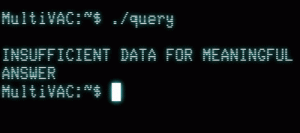The Last Question is a short story by Isaac Asimov that tackles concepts about whether or not entropy, the irreversible tendency for everything to die and deteriorate, can be stopped or reversed. In this work of science fiction, Asimov gives readers fleeting glimpses into the evolution of humanity as it learns to harness the power of the sun for intergalactic travels, and eventually transcends corporality and becomes omni-present.
We are driven along the narrative by an increasingly urgent need to know how to prevent heat death. Heat death is a plausible theory about how the universe will come to an end. As the universe continues to slow down and expand, there will be no thermodynamic free energy to continue sustaining life.
Throughout this timeline, we witness the growth of Multivac, the technology responsible for learning how to harness energy from the sun. It is a self-sustaining entity that moves from a singular Multivac unity into portable Microvacs, then into a Galactic AC with its own planet, to a Universal AC that is said to be contained in a planet but is omni-present and able to interact with the evolved humanity through thought. We finally witness the Cosmic AC, which is no longer located in space, but in its own pocket of existence, as it fuses with man into AC, thus eradicating the physicality of the human.

These godlike descendants of humanity, now existing as stored minds rather than corporeal bodies, watch the heat death of the universe, and ask AC once more what can be done. In an immeasurable amount of time after the heat death, AC finally gives an answer, “Let there be light,” and there is once again light.
“Let there be light” is a reference to the Biblical story of creation, spoken in Genesis 1:3
And God said, “Let there be light,” and there was light.
Asimov takes this line and gives it to a human byproduct that has evolved into a sentient, unprogrammable entity. It is this line that leads me to believe The Last Question is an allegory for processes of myth making. Myths exist as timeless stories; they are not depicting moments in time, but can be thought of as endless and ever-present guides for how we should structure our lives. In other words, they are cyclical.
This cyclic structure is reflected in The Last Question, wherein we start and end our reading at the same point in time. Asimov’s story is eternal it that its timeline can never be stopped; AC will continuously reset the world with God’s word. As the timeline cannot come to an end, neither can the story itself. Stories have the power to become machines of self-perpetuation, creating their own immortality. Someone will always have read, be reading, or will read this piece. Isaac Asimov is dead, but his stories still circulate and, in this way, sustain a part of who he was. However, is that immortality dependent upon having readers?
The Last Question expresses the notion that stories and myths would cease to have purpose without people to read and connect with them. After the heat death has occurred, AC essentially restarts life so that there will be people who need its assistance, thus ensuring it will both be reinvented and given purpose. I think this reflects on a crucial aspect of what it means to be human — this desire to connect, be heard, and make an impact.
The story also tackles the relationship of life and the body. It asks us to consider how far we can extend and alter what we know as humanity until it becomes something entirely other. Humanity has moved beyond physical bodies, instead existing as a web of consciousness. We could take this to be an understanding of our species as something that does not require a particular bodily form or linear narrative; instead, we are humans because of our minds and the data that we create and retain.
Would we achieve immortality through preservation of the body, or the mind? Would we be immortal if we lived in a cyclic universe, where the evolution of our species is constantly being relived and repeated?
The Last Question depicts a future where we have control over our own fate, and reflects on the desire to be contained with in an ever-existing and expanding history. It reflects on humanity’s thirst for knowledge and the desire for quick and simple answers to complex queries.
Source
Recent Comments